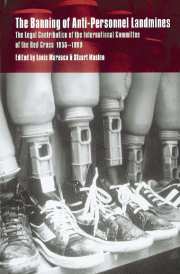 The Banning of Anti-Personnel Landmines
The Banning of Anti-Personnel Landmines Book contents
- Frontmatter
- Contents
- Foreword by Cornelio Sommaruga, President, International Committee of the Red Cross
- Foreword by Ambassador Jacob S. Selebi, South Africa
- Foreword by Ambassador Johan Molander, Sweden
- Introduction
- PART 1 FROM PRINCIPLES TO RULES: REGULATING MINES UP TO THE 1980 CONVENTION ON CERTAIN CONVENTIONAL WEAPONS
- 1 Historical background: the international law governing weapons
- 2 The ICRC's draft rules to protect civilian populations 1955–1956
- 3 Expert contributions to the Diplomatic Conference on the Reaffirmation and Development of International Humanitarian Law Applicable in Armed Conflicts 1973–1977
- 4 The United Nations Convention on Prohibitions or Restrictions on the Use of Certain Conventional Weapons Which May be Deemed to be Excessively Injurious or to Have Indiscriminate Effects, adopted 10 October 1980
- PART 2 THE REVIEW CONFERENCE OF THE 1980 CONVENTION ON CERTAIN CONVENTIONAL WEAPONS: AN INITIAL RESPONSE TO THE LANDMINE CRISIS
- PART 3 THE OTTAWA PROCESS FROM REGIONAL INITIATIVES TO AN INTERNATIONAL PROHIBITION OF ANTI-PERSONNEL MINES
- Index
1 - Historical background: the international law governing weapons
from PART 1 - FROM PRINCIPLES TO RULES: REGULATING MINES UP TO THE 1980 CONVENTION ON CERTAIN CONVENTIONAL WEAPONS
Published online by Cambridge University Press: 03 December 2009
- Frontmatter
- Contents
- Foreword by Cornelio Sommaruga, President, International Committee of the Red Cross
- Foreword by Ambassador Jacob S. Selebi, South Africa
- Foreword by Ambassador Johan Molander, Sweden
- Introduction
- PART 1 FROM PRINCIPLES TO RULES: REGULATING MINES UP TO THE 1980 CONVENTION ON CERTAIN CONVENTIONAL WEAPONS
- 1 Historical background: the international law governing weapons
- 2 The ICRC's draft rules to protect civilian populations 1955–1956
- 3 Expert contributions to the Diplomatic Conference on the Reaffirmation and Development of International Humanitarian Law Applicable in Armed Conflicts 1973–1977
- 4 The United Nations Convention on Prohibitions or Restrictions on the Use of Certain Conventional Weapons Which May be Deemed to be Excessively Injurious or to Have Indiscriminate Effects, adopted 10 October 1980
- PART 2 THE REVIEW CONFERENCE OF THE 1980 CONVENTION ON CERTAIN CONVENTIONAL WEAPONS: AN INITIAL RESPONSE TO THE LANDMINE CRISIS
- PART 3 THE OTTAWA PROCESS FROM REGIONAL INITIATIVES TO AN INTERNATIONAL PROHIBITION OF ANTI-PERSONNEL MINES
- Index
Summary
International humanitarian law is the branch of international law concerned with the waging of warfare. It regulates the conduct of hostilities and the treatment of those not actively participating in the conflict (namely, civilians, the wounded and sick, and prisoners of war). It seeks to minimize suffering and ensure that both combatants and civilians are treated humanely. Although international treaties on the subject are of fairly recent origin, practices regulating armed hostilities are evident throughout history. Even before there were States, battles fought between tribes, clans or other groups were often governed by rules to mitigate the effects of armed violence. The ancient texts of many civilizations show that in war, prisoners were not to be killed but taken and well treated; women, children and the elderly were not to be harmed; and warriors should not use barbarous weapons or methods of attack. While such practices were often founded on grounds of religion, morality or honour, they are the forerunners of the legal regime States have developed to regulate armed conflict.
International humanitarian law is based on the precept that the sole objective of war is to overpower the armed forces of the opponent. Men become the legitimate object of attack solely because of their relationship with the making of warfare. In his renowned work The Social Contract (1762) Jean-Jacques Rousseau formulated one of the law's philosophical footings:
War is in no way a relationship of man with man but a relationship between States, in which individuals are only enemies by accident, not as men but as soldiers'.
- Type
- Chapter
- Information
- The Banning of Anti-Personnel LandminesThe Legal Contribution of the International Committee of the Red Cross 1955–1999, pp. 7 - 14Publisher: Cambridge University PressPrint publication year: 2000


